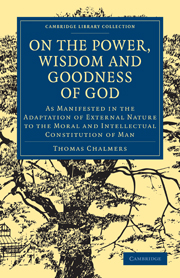 On the Power, Wisdom and Goodness of God
On the Power, Wisdom and Goodness of God Book contents
- Frontmatter
- Dedication
- NOTICE
- Contents
- PREFACE
- INTRODUCTORY CHAPTER
- PART I ON THE ADAPTATION OF EXTERNAL NATURE TO THE MORAL CONSTITUTION OF MAN
- CHAP. I FIRST GENERAL ARGUMENT
- CHAP. II SECOND GENERAL ARGUMENT
- CHAP. III THIRD GENERAL ARGUMENT
- CHAP. IV On the General Adaptation of External Nature to the Moral Constitution of Man
- CHAP. V On the Special and Subordinate Adaptations of External Nature to the Moral Constitution of Man
CHAP. I - FIRST GENERAL ARGUMENT
Published online by Cambridge University Press: 29 August 2010
- Frontmatter
- Dedication
- NOTICE
- Contents
- PREFACE
- INTRODUCTORY CHAPTER
- PART I ON THE ADAPTATION OF EXTERNAL NATURE TO THE MORAL CONSTITUTION OF MAN
- CHAP. I FIRST GENERAL ARGUMENT
- CHAP. II SECOND GENERAL ARGUMENT
- CHAP. III THIRD GENERAL ARGUMENT
- CHAP. IV On the General Adaptation of External Nature to the Moral Constitution of Man
- CHAP. V On the Special and Subordinate Adaptations of External Nature to the Moral Constitution of Man
Summary
On the Supremacy of Conscience
1. An abstract question in morals is distinct from a question respecting the constitution of man's moral nature; and the former ought no more to be confounded with the latter, than the truths of geometry with the faculties of the reasoning mind which comprehends them. The virtuousness of justice was a stable doctrine in ethical science, anterior to the existence of the species; and would remain so, though the species were destroyed—just as much as the properties of a triangle are the enduring stabilities of mathematical science; and that, though no matter had been created to exemplify the positions or the figures of geometry. The objective nature of virtue is one thing. The subjective nature of the human mind, by which virtue is felt and recognised, is another. It is not from the former, any more than from the eternal truths of geometry, that we can demonstrate the existence or attributes of God—but from the latter, as belonging to the facts of a creation emanating from His will, and therefore bearing upon it the stamp of His character. The nature and constitution of virtue form a distinct subject of enquiry from the nature and constitution of the human mind. Virtue is not a creation of the Divine will, but has had everlasting residence in the nature of the Godhead.
- Type
- Chapter
- Information
- On the Power, Wisdom and Goodness of GodAs Manifested in the Adaptation of External Nature to the Moral and Intellectual Constitution of Man, pp. 57 - 98Publisher: Cambridge University PressPrint publication year: 2009First published in: 1834
